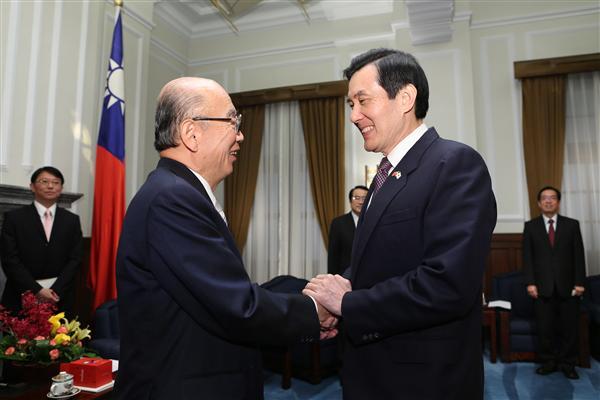News & activities
 News releases
News releases
President Ma Ying-jeou met on the morning of February 23 with a delegation from Japan's Sankei Shimbun, a finance and business newspaper, led by the group's chairman Takehiko Kiyohara. The president expressed admiration for the newspaper's resolute commitment to objective reporting and promotion of freedom and democracy since its founding in 1933.
In remarks, the president stated that since taking office in 2008 he has been interviewed once by the newspaper's former president Nagayoshi Sumida and once by editor in chief Masafumi Katayama. President Ma also noted that when flights commenced between Tokyo's Haneda Airport and Taipei's Songshan Airport, Mr. Kiyohara was on the first flight to Taipei. The president commented that Mr. Kiyohara has made outstanding contributions to the promotion of the development of relations between the two countries.
The president stated that relations between Taiwan and Japan have always been quite close. The two countries maintain strong ties in the areas of trade, tourism, and cultural exchanges, he said. Even though the ROC and Japan do not maintain formal diplomatic relations, tourists each year make nearly three million visits between the two countries. President Ma noted that generous donations by the people of Taiwan to Japan after the Great East Japan Earthquake of March 11, 2011 exceeded those from all other nations after that disaster. President Ma also pointed out that the Yoichi Hatta Memorial Park was established at the Wusanto Reservoir in southern Taiwan's Tainan County in recognition of the Japanese engineer's contributions to the design and construction of the irrigation network in that region. All of these examples point to the "special partnership" between Taiwan and Japan, he stated.
Turning the topic to the Diaoyutai Islets, President Ma mentioned that disputes have been seen recently over the sovereignty of these islands, creating a tense atmosphere in the region. The president stated that the ROC has consistently maintained that the Diaoyutais are inherent territory of the ROC and are appurtenant to Taiwan. The government at the same time, however, has introduced the East China Sea Peace Initiative with the hope that all concerned parties will exercise self-restraint and that tensions can be reduced. The president said the initiative calls for shelving of the dispute and for peaceful resolution of the controversy, which would be in the best interests of the people in the region. President Ma called for stronger interaction and communication with the Japanese media, saying that he is confident that this would provide an important impetus to the development of relations between the two countries in the future.
The president opined that although sovereignty over national territory cannot be compromised, natural resources can be shared, and in fact the ongoing fisheries talks between Taiwan and Japan are a peaceful way to establish the sharing of resources. President Ma expressed hope that both sides will be able to reach a consensus at an early date and sign a bilateral fisheries agreement.
The four-person delegation was led by Sankei Shimbun Chairman Kiyohara, and was accompanied to the Presidential Office by Vice Minister of Foreign Affairs Vanessa Yea-Ping Shih (史亞平) to meet with President Ma. Also attending the meeting was National Security Council Advisor Lee Chia-chin (李嘉進).



